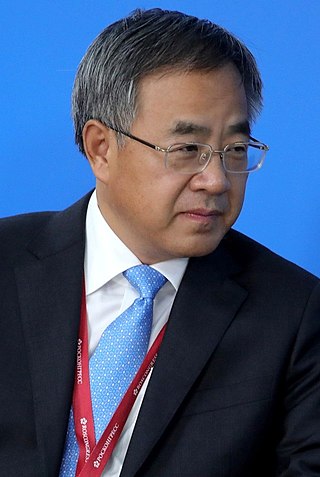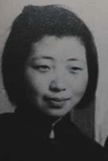Related Research Articles

The Princelings, also translated as the Party's Crown Princes, are the descendants of prominent and influential senior communist officials in the People's Republic of China. It is an informal, and often derogatory, categorization to signify those believed to be benefiting from nepotism and cronyism, by analogy with crown princes in hereditary monarchies. Many of its members hold high-level political and business positions in the upper echelons of power.

The Foreign Affairs Commission of the Central Committee of the Chinese Communist Party, commonly called the Central Foreign Affairs Commission, is a commission of the Central Committee of the Chinese Communist Party (CCP) that exercises general oversight on matters related to foreign affairs.

Ye Jianying was a Chinese Communist revolutionary leader and politician, one of the Ten Marshals of the People's Republic of China. He was the top military leader in the 1976 coup that overthrew the Gang of Four and ended the Cultural Revolution, and was the key supporter of Deng Xiaoping in his power struggle with Hua Guofeng. After Deng ascended power, in his capacity as Chairman of the Standing Committee of the National People's Congress, Ye served as China's head of state during the period from 1978 to 1983.

Xi Zhongxun was a Chinese communist revolutionary and a subsequent political official in the People's Republic of China. He is considered to be among the first and second generation of Chinese leadership. The contributions he made to the Chinese communist revolution and the development of the People's Republic, from the founding of Communist guerrilla bases in northwestern China in the 1930s to initiation of economic liberalization in southern China in the 1980s, are numerous and broad. He was known for political moderation and for the setbacks he endured in his career. He was imprisoned and purged several times. His second son, Xi Jinping, is the current President of China and General Secretary of the Chinese Communist Party.

Xi Jinping is a Chinese politician who has been the general secretary of the Chinese Communist Party (CCP) and chairman of the Central Military Commission (CMC), and thus the paramount leader of China, since 2012. Xi has also been the president of the People's Republic of China (PRC) since 2013. As a member of the fifth generation of Chinese leadership, Xi is the first CCP general secretary born after the establishment of the PRC.

Hu Chunhua is a Chinese politician. He currently serves as Vice Chairman of the National Committee of the Chinese People's Political Consultative Conference since 2023. From 2018 to 2023, he served as Vice Premier of the State Council of the People's Republic of China.

Zhang Dejiang is a Chinese retired politician who served as the chairman of the Standing Committee of the National People's Congress between 2013 and 2018. He was also the third-ranking member of the Politburo Standing Committee of the Chinese Communist Party from 2012 to 2017.

Zhang Gaoli is a Chinese retired politician. He served as the senior Vice Premier of the State Council between 2013 and 2018 and as a member of the Chinese Communist Party Politburo Standing Committee, China's highest ruling council, between 2012 and 2017. Prior to his ascension, Zhang served as the Communist Party Secretary of Tianjin between 2007 and 2012, and the Party Secretary in the economic powerhouse of Shandong province between 2002 and 2007.

Beijing Jingshan School is a public K–12 school in Dongcheng, Beijing, China. The school is supervised by the Beijing City Dongcheng District Education Committee.

Wang Yang is a Chinese retired politician who served as the chairman of the National Committee of the Chinese People's Political Consultative Conference from 2018 to 2023. He was also the fourth-ranking member of the Politburo Standing Committee of the Chinese Communist Party from 2017 to 2022.

Li Zhanshu is a Chinese retired politician, who was the chairman of the Standing Committee of the National People's Congress from 2018 to 2023. He was the third-ranking member of the Politburo Standing Committee of the Chinese Communist Party, China's top decision-making body, between 2017 and 2022.

Zhang Youxia is a Chinese general in the People's Liberation Army (PLA) and currently the first-ranked Vice Chairman of the Central Military Commission (CMC). He previously served as Head of the CMC Equipment Development Department, and its predecessor, the PLA General Armaments Department, from 2012 to 2017. He is the son of General Zhang Zongxun. He is a veteran of the 1979 Sino-Vietnamese War and one of the few serving generals in China with war experience.

Cai Qi is a Chinese politician, who is the current first-ranked secretary of the Secretariat of the Chinese Communist Party, fifth-ranking member of the CCP Politburo Standing Committee. He is also the serving directors of both the CCP General Office and General Secretary's office, both powerful and influential positions within the internal administrative apparatus of the Chinese Communist Party.
Xi Mingze, nicknamed Xiao Muzi, is the only child of Xi Jinping, General Secretary of the Chinese Communist Party, and singer Peng Liyuan.
The following lists events that happened during 2015 in China.

Ren Zhiqiang is an incarcerated Chinese real estate tycoon and a blogger on Sina Weibo with more than 37 million followers. Nicknamed "Big Cannon Ren", he is known for his outspoken criticism of the Chinese Communist Party (CCP). He disappeared on 12 March 2020 after criticizing CCP general secretary Xi Jinping as a "clown" over the handling of China's response to the COVID-19 pandemic. In September 2020 he was sentenced to eighteen years' imprisonment on corruption charges, after a one-day trial.
Deng Jiagui is a Chinese businessman, and brother-in-law of Xi Jinping, who is current General Secretary of the Chinese Communist Party and paramount leader of China since 2012.
Xiao Jianhua is a Chinese-Canadian businessman and billionaire known for managing assets for the descendants of prominent Chinese leaders. He was taken from Hong Kong to mainland China in 2017. Canadian diplomats were denied access to his trial by a Shanghai court, which sentenced him to 13 years in jail and fined his company more than $8 billion for embezzlement and bribery.

Qi Xin is a Chinese author and member of the Chinese Communist Party (CCP), who wrote various articles on her husband, Chinese communist revolutionary Xi Zhongxun. She is the mother of Xi Jinping, current General Secretary of the Chinese Communist Party, also known as the paramount leader.
Marshal Peng Dehuai is a 2016 Chinese biographical historical drama television series directed by Song Yeming and written by Ma Jihong, Gao Jun and Xu Jiang, based on the life of Peng Dehuai (1898-1974), a prominent Chinese Communist military leader during the 20th century. The series stars Dong Yong as Peng Dehuai, alongside Yang Tongshu, Tang Guoqiang, Liu Jing, Wang Wufu, and Luo Gang.
References
- 1 2 3 4 5 6 7 8 9 10 11 12 "与祖国共命运——对话清华EMBA04D班 齐桥桥" [A common destiny with the homeland: dialogue with class 04D of the EMBA course at Qinghua University: Qi Qiaoqiao]. Xinlangwang. 11 November 2011. Retrieved 28 April 2017.
- 1 2 3 Forsythe, Michael (17 June 2014). "As China's Leader Fights Graft, His Relatives Shed Assets". New York Times. Retrieved 28 April 2017.
- ↑ Forsythe, Michael (17 June 2014). "As China's Leader Fights Graft, His Relatives Shed Assets". The New York Times. ISSN 0362-4331 . Retrieved 3 September 2022.
- ↑ Garnaut, John (30 June 2012). "Chinese leader's family worth a billion". Sydney Morning Herald. Retrieved 3 August 2019.
- ↑ "习近平姐夫邓家贵先生真的是牺牲了巨大利益吗?" [Is Xi Jinping's brother-in-law really sacrificing huge benefits?]. Bowen She (in Chinese). 31 October 2015. Retrieved 28 April 2017.
- ↑ Forsythe, Michael (30 October 2015). "Chinese Tycoon Wang Jianlin Defends Xi's Relatives, and Himself, on Business Deal". New York Times. Retrieved 28 April 2017.
- ↑ Stevenson, Alexandra; Forsythe, Michael (12 August 2020). "Luxury Homes Tie Chinese Communist Elite to Hong Kong's Fate". The New York Times. ISSN 0362-4331 . Retrieved 28 August 2020.
- 1 2 "Xi Jinping Millionaire Relations Reveal Fortunes of Elite". Bloomberg.com. 29 June 2012. Retrieved 28 August 2020.
- ↑ "習家族6億港物業曝光 香港大陸化 太子黨「撤資」". Apple Daily 蘋果日報 (in Chinese (Hong Kong)). Archived from the original on 23 September 2020. Retrieved 28 August 2020.
